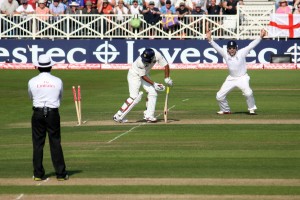Test no. 2001 is a Pace Odyssey for England
Wednesday, August 3rd, 2011In 2007, on the last day of the England-India Test at Trent Bridge, I made use of my complimentary Day 5 ticket to go and watch India rattle off the 63 more runs they needed for victory.
Granted, Chris Tremlett caused them a few hiccups in the form of three wickets that morning, but India were so obviously the stronger side that very few England fans turned up for the inevitable denouement.
Tendulkar had scored 91; Zaheer Khan had taken 5-75, and while England had had the better of a draw at Lord’s, they were thoroughly outplayed by the visitors in Nottingham. Tremlett aside, individual contributions for England were sporadic. Michael Vaughan, the cartilage in his right knee by this time crumbling quicker than a two-week old digestive biscuit, made a magnificent, into-the-breach 124 on the fourth day, but more was expected of other men who did not deliver. With bat, ball and aggression, India were the laser-guided missile aimed right at England’s soft underbelly.
What a difference four years makes. Since then we have had the IPL, fear for the future of Tests (though that hot potato was already being fiercely debated) and the DRS can has been prised open and worms are wriggling all over the damn place.
India have become the number one ranked Test side. England has won the Ashes twice, home and away.
Of more immediate import to a spectator at Trent Bridge this year, there also seemed to be a heck of a lot more wasps about. Buying an ice-cream could possibly have proved fatal.
We’ve already had a cracker of a first Test in this series, the 2000th, no less, which lived up to all the hype that preceded it, but gave us an India strangely apathetic and “undercooked”.
Duncan Fletcher has said in the past he likes his charges to go into a series a little underdone, which makes him sound like an avant garde chef with some strange Heston-Blumenthalesque ideas when it comes to cooking up the right ingredients for a Test-winning outfit. I’m assuming he may have meant something along the lines of al dente pasta rather than salmonella chicken, but such is Fletcher’s inscrutability, it’s impossible to tell. Like I said, I give him a year.
One other thing that’s changed since 2007 is that Stuart Broad is the new Botham. Which may or may not follow on from being the next Botham. And which I could also curmudgeonly extend to a future which contains the phrase “once touted as”, three words filled with gentle regret over lost potential, or a flame that burned out too soon.
But let’s not go there yet – this is NOW, dammit. And it is glorious. England are leading this four match series 2-0 and are one win or two draws away from being the Big Fromage. The Edam of Excellence. The Gouda of Greatness. The Cottage Cheese of Clinical Conquest. The Dairylea of Dominance.
You can tell I am writing this near tea-time.
Broad was given the Man of the Match Award for not only reminding us he can bat, but also for proving his critics right when they said he’d never be successful if he kept banging it in half-way down the pitch with every delivery and with delusions of grandeur about being England’s “enforcer” rattling around in his blond head.
With a little bit of help from the DRS (no referral for the Harbhajan Singh lbw that turned out to be a deflection from bat onto pad so obvious it only needed the replay to see it) the boy Broad bagged himself a hat-trick and the gratitude of a nation, helping us all to feel a little less irritated at his tendency towards petulance and wilful obstinacy, when all it took was pitching the bloody ball up and bowling straight.
Jimmy Anderson chipped in as well with a thunderbolt of an in-swinging leg-cutter that sent VVS Laxman’s off-stump cartwheeling; one of those Jesus deliveries we see every so often from Anderson and that, if you are a worshipper of fast bowling, make the heart sing.
Broad may have deservedly been dubbed Man of the Match, but Tim Bresnan was Man of the Day with his 90 off 118 balls and his first five-wicket haul in Tests; that Bressie-lad did all this on Yorkshire Day must surely prove which side of the Pennines the Great Almighty is more partial to.
While pace won it for England, one batting feat for England is impossible to talk about without mentioning the controversy that accompanied it. In 2007 there was Jellybeangate; in 2011 it was Runoutgate, or whatever the Twitter “hash tag” is that’s been appended to it. Bell’s 159 came not just with a single slice of luck, but the whole damn pie: the Flan of Fortune, if you will.
Of course there have been two distinct, polarized points of view regarding the run-out. First, that Bell was wandering out of his ground and off for his tea because he assumed the ball Eoin Morgan had flicked off his pads had gone for four and that the over had been called, in which case all he was guilty of was extreme doziness and India’s move in removing the bails was a rather sly one.
On the other hand, never do the umpires’ job for them, and never assume. The run-out was legitimate; the umpires followed the letter of the law in giving him out, and well, hard cheese, Ian… you won’t be doing that again in the future, will you?
Uncomfortable memories of the Murali runout in 2006 and the 2008 Collingwood-Elliott incident at the Oval were dredged up; furious debate erupted over the Laws versus the Spirit of the game; the crowd howled its fury and disappointment and Trent Bridge turned into the Terrordome.
So when a small, ginger-haired batsman re-emerged from the pavilion, eyes cast sheepishly down but defiantly practising his forward defensive on his way back out to the middle, the boos that greeted the umpires and the Indian fielders turned into cheers when it emerged MS Dhoni had withdrawn his appeal, after being requested to do so by Andrew Strauss and Andy Flower, and by bending the rule that says you can only withdraw an appeal while the batsman is still on the field of play.
Everyone agreed that India had done A Good Thing. And I’d like to think Paul Collingwood may have benefited from a 20 minute break so that cooler heads might have prevailed after Ryan Sidebottom barged into Grant Elliot.
But I have a couple of issues with all of this. It is all very well citing the Spirit of Cricket, and it is of course a good thing to aspire to decency and fairness in the sport in which you choose to participate, or indeed of any other aspect that constitutes daily life and your interactions with others.
But if it had been, Kevin Pietersen, say, instead of Ian Bell at the centre of this brief but intense shit-storm, would Dhoni still have withdrawn his appeal?
One man’s spirit of cricket could very well represent a lack of killer instinct to someone else. My problem with the admirable but nebulous “spirit of the game” is that in the end it is all down to who, where, when and what – who is at the crease, the match situation, what it means for the series, the risk of having your house burned down back in India versus having missiles thrown at you on an English cricket ground.
We stopped expecting batsmen to walk when they knew they’d nicked it long ago. If you walk, you are regarded as a charming eccentric whose playing career will no doubt come to a premature end because of it. Who’s to say in ten years we’ll look back at what happened at Trent Bridge and wonder, with the Test top spot up for grabs, at the admirable but charming quaintness of Dhoni’s action?
When “doing the right thing” involves the inevitable conflict between morality and self-interest, there is never any guarantee that the “right” decision will be made.
Andy Flower’s assertion that “We felt that Bell wasn’t attempting to take a run and therefore we wanted to ask the Indian side to reconsider their appeal” does not sit all that easily with his admonition to Andrew Strauss after the England captain’s recall of Sri Lankan batsman Angelo Mathews in a Champions Trophy clash in 2009. Mathews was run out after a collision with Graham Onions that was entirely accidental – Onions was genuinely trying to get out of Mathews’ way – but Flower stated afterwards: “I just wouldn’t have done it. I would have sent the batsman on his way. He ran into the bowler. Simple deal.” Hmm.
I think Dhoni made the right decision but Bell, according to the Laws of the game, was completely in the wrong and his on-camera interview after close of play was evasive and defensive; no doubt he had been coached on what to say, as he could barely give a straight answer to any of the questions.
Perhaps the best thing that can be said of all this ruckus is that England did not win by 22 runs – or the 69 more runs Bell put on with Morgan after the former was reinstated.
International incident narrowly averted. Going by the blizzard of gushing, laudatory press releases that began landing on journos’ desks soon after, Dhoni’s act of chivalry seems to have been seized on with some relief by the various governing bodies at being handed a break from having to deal with the rather more pressing concerns of slow over-rates and the non-use of Hawk Eye in lbw decisions.
Shane Warne referred to the “warm, fuzzy” feel-good feeling that enveloped Trent Bridge after the resolution of Bellgate. While cricket is currently dislocating its shoulders slapping its own back, and enjoying an enthusiastic orgy of self-fellatio, a bigger storm could very well be brewing on the horizon.

